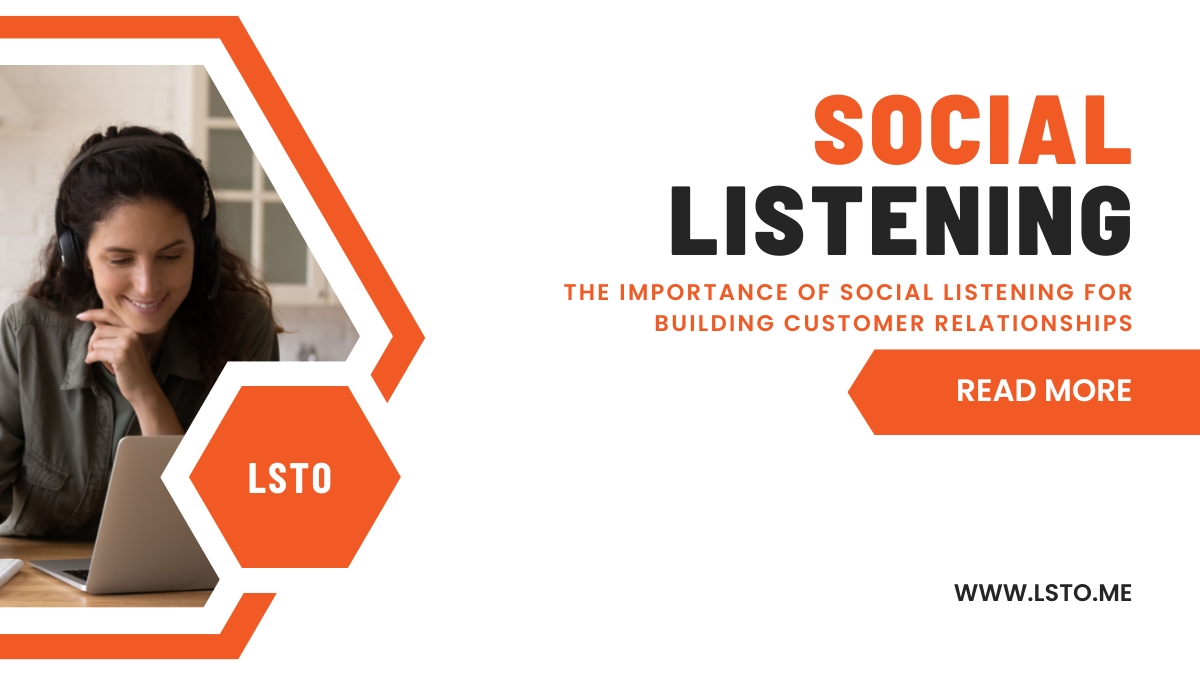
In today’s fast-paced digital world, social media has become a key tool for businesses to connect with their customers. However, simply having a social media presence is not enough. To truly build strong customer relationships, businesses must engage in social listening. In this blog post, we will explore what social listening is, why it is important, and how businesses can use it to build better customer relationships.
What is Social Listening?
Social listening is the process of monitoring social media platforms for mentions of your brand, products, or services. It involves analyzing the data collected from social media platforms to gain insights into how customers perceive your brand, what they like, and what they don’t like. Social listening can be done manually or through the use of specialized social listening tools.
Why is Social Listening Important?
1. Improved Customer Service:
In today’s fast-paced world, customers demand quick and efficient responses to their inquiries and complaints. Businesses that fail to deliver on this expectation risk losing loyal customers and damaging their reputation. Fortunately, social listening has emerged as a powerful tool for improving customer service. By monitoring social media conversations related to their brand, businesses can quickly identify customer complaints or inquiries and respond in a timely manner.
Social listening allows businesses to gain valuable insights into their customers’ needs and preferences. By analyzing social media data, businesses can identify trends and patterns that help them make informed decisions about product development, marketing strategies, and customer service improvements. Social listening also enables businesses to track sentiment analysis, which provides an understanding of how customers feel about their brand.
Moreover, social listening is crucial for maintaining a positive reputation online. Negative comments or reviews left unanswered on social media platforms can damage a business’s image significantly.
2. Brand Reputation Management:
In today’s digital world, brand reputation management has become more critical than ever. With the rise of social media platforms and online review sites, businesses must monitor what customers are saying about them online. This is where social listening comes into play – it enables businesses to keep a close eye on their online reputation and respond promptly to any negative comments or reviews.
Social listening involves using tools to monitor various social media platforms and other online channels for mentions of your brand name, products or services. By doing so, you can gain valuable insights into what your customers like and dislike about your business. You can also identify potential issues before they escalate into major problems that could damage your brand reputation.
Furthermore, timely responses to negative comments or reviews show that you care about your customers’ opinions and are willing to take action based on feedback received.
3. Product and Service Development:
Social listening has become an essential tool for businesses looking to develop better products and services. It involves monitoring social media platforms, online forums, and review sites to identify what customers like and dislike about a company’s offerings. By gathering this information, businesses can gain valuable insights into their customers’ preferences, pain points, and needs.
One of the greatest benefits of social listening is that it enables businesses to stay ahead of the curve when it comes to product development. By identifying emerging trends in customer behavior or preferences, companies can adapt their products or services proactively without waiting for negative feedback. This not only helps them stay competitive but also ensures that they are meeting the changing needs of their customers in real-time.
Another advantage of social listening is that it provides businesses with a direct line of communication with their customers.
How Can Businesses Use Social Listening to Build Better Customer Relationships?
1. Engage with Customers:
In today’s digital age, businesses have access to a plethora of tools and technologies that can help them engage with their customers more effectively. One such tool is social listening. By monitoring social media platforms for mentions of their brand, products or services, businesses can gain valuable insights into what their customers are saying about them. This information can then be used to respond appropriately and build stronger relationships with customers.
Social listening allows businesses to not only hear what their customers are saying but also understand how they feel. By analyzing the tone and sentiment of customer feedback, businesses can identify areas where they may need to improve or make changes. Responding promptly and positively to customer feedback shows that a business values its customers’ opinions and cares about their satisfaction.
Building strong customer relationships is crucial for any business looking to succeed in the long-term.
2. Provide Personalized Customer Experiences:
In today’s business landscape, creating personalized customer experiences is the key to success. With customers becoming increasingly demanding and discerning, businesses need to understand their needs and preferences to create tailored solutions. Social listening can help businesses achieve this goal by providing valuable insights into customer behaviors and preferences.
By analyzing social media conversations, businesses can identify their customers’ pain points, likes, dislikes, and buying habits. This data can be used to tailor products and services that meet the specific needs of individual customers. By providing a personalized experience, businesses can build stronger relationships with their customers and increase brand loyalty.
Moreover, social listening allows businesses to track customer sentiment towards their brand in real-time. This enables them to address negative feedback promptly before it escalates into a full-blown crisis. Social listening also helps businesses stay ahead of emerging trends in their industry by monitoring conversations about competitors or new product ideas.
3. Develop Stronger Brand Loyalty:
Businesses that want to develop stronger brand loyalty must listen to their customers. This is where social listening comes in handy. With the advent of social media, businesses can easily monitor what people are saying about them and their products or services. In doing so, businesses can identify areas where they need to improve and respond promptly to customers’ concerns.
By listening closely to customer feedback, businesses can build stronger relationships based on trust and mutual understanding. When customers feel that their opinions matter and that they are being heard, they are more likely to remain loyal to a brand. This is because they know that the business cares about their needs and is willing to make changes based on their feedback.
Developing strong customer relationships takes time and effort, but social listening can help expedite the process.
Best Practices for Social Listening
1. Define Your Objectives:
Social listening is a powerful tool that businesses can use to monitor online conversations about their brand, products, and industry. However, before embarking on a social listening campaign, it’s crucial for businesses to define their objectives and what they hope to achieve. Defining your objectives will help you focus your efforts and ensure that your social listening strategy aligns with your business goals.
To define your objectives for social listening, start by considering the key questions you want to answer through this process. What are the pain points or challenges customers are facing? Where do they go for information related to your industry? What do they think of your brand compared to competitors? These questions will help guide you in setting specific goals for your social listening campaign.
Once you have defined your objectives, it’s important to establish metrics that will measure the success of your social monitoring efforts.
2. Choose the Right Tools:
Social listening is an essential part of any successful social media strategy. It involves monitoring online conversations about your brand, industry or competitors in real-time. Social listening tools make it easier to keep track of what people are saying about your company and provide valuable insights to improve your marketing efforts. However, with so many options available, businesses need to be careful when choosing the right tool for their needs and budget.
The first step in choosing a social listening tool is to understand what you want to achieve from it. Do you want to monitor mentions of your brand across different social media platforms? Or do you want to track how well your competitors are doing on social media? Once you have a clear idea of what you need the tool for, you can start comparing different options available in the market.
Another important consideration is budget. Social listening tools can vary widely in price depending on their features and capabilities.
3. Monitor Social Media Channels Regularly:
Social media has opened up a world of possibilities for businesses to connect with their customers. However, it also presents an ever-changing landscape that requires constant monitoring and attention. To ensure the best practice for social listening, businesses must monitor their social media channels regularly.
Monitoring social media channels is crucial to stay on top of customer feedback, reviews, and comments. This not only helps improve customer satisfaction but also allows businesses to identify potential issues before they become crises. By actively listening and responding to feedback, businesses can build stronger relationships with customers, increase brand loyalty and ultimately drive sales.
Moreover, regular monitoring can help businesses identify trends in customer behavior and preferences. This information can be used to tailor marketing campaigns and product offerings to better meet the needs of consumers. Social listening is an essential component of any successful digital marketing strategy today.
4. Respond Promptly:
In today’s world, social media plays a vital role in connecting customers with businesses. When customers reach out to a business on social media, they expect a prompt response. Whether it is a query or complaint, customers anticipate an instant reply from the brand. It is where social listening comes into play as one of the best practices for businesses.
Social listening involves monitoring and analyzing conversations about your brand on social media platforms like Facebook, Twitter, Instagram, etc. It allows brands to understand their customer’s sentiments and take corrective measures if required. Social listening enables businesses to build strong relationships with their audience by responding promptly to their queries or concerns. Moreover, it helps in improving brand perception and reputation in the market.
Businesses should aim to respond promptly when engaging with customers on social media platforms as it creates a positive impact on customer satisfaction levels.
Conclusion
Social listening is a crucial component of building strong customer relationships. By monitoring social media platforms for mentions of their brand, businesses can gain valuable insights into customer needs and preferences, providing a more personalized customer experience. By responding promptly to customer inquiries and complaints, businesses can improve customer satisfaction and loyalty. Social listening should be an essential part of any business’s social media strategy, as it provides valuable data that can be used to improve products and services and build stronger customer relationships.




